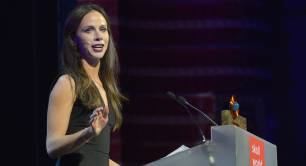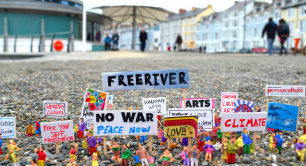Skoll World Forum audience urged to face uncomfortable truths
A colonial mindset still dominates philanthropy and social investment, attendees at one of the year’s biggest – and perhaps most exclusive – social entrepreneurship gatherings were told earlier today.
At the opening of the Skoll World Forum in Oxford, England, author and social justice philanthropy expert Edgar Villanueva warned some 1,200 attendees from 81 countries of a persisting “bubble of privilege” among foundations and investors.
“Colonisation was about accumulating wealth,” said Villanueva, author of Decolonizing Wealth: Indigenous Wisdom to Heal Divides and Restore Balance. “Fast-forward to present day with foundations and folks who are investors: there’s a history there about how that wealth was accumulated. On whose back was that wealth earned?”
The power imbalance is visible, he added, both in who makes decisions about where the money goes, and who gets it. Wealthy people are more likely to be white; they are the ones to set up foundations and then run them. The majority of foundation boards in the US are white men, according to the author, while 95% of grant money goes to organisations that are white-led.
This injustice is particularly galling, he said, given the role that many of these communities have played in “helping build wealth around the world – through genocide and stolen land – things that are kind of uncomfortable to discuss, but it’s a reality.”
“We have to really examine that, if we want to see change happen,” Villanueva said. “Change is happening in the margins, there are a lot of solutions and really good ideas and brave thinking happening from folks who have not been privileged to be part of this circle. We need to tap into that in order to see change.”
Of Native American origin, Villanueva was the first in his family to graduate from high school. He got a job in philanthropy partly thanks to his first-hand experience of some of the issues his new employer wanted to address, and admitted he had to overcome doubts about a career focused on “moving money”. He is currently vice-president of programs and advocacy at the Schott Foundation for Public Education.
The author was warmly received by an audience that represents many of the world’s most influential funders. The Skoll World Forum is invitation only, and tickets to this year’s event – the 16th edition – were priced at US$1,300 - $3,500. For the first time this year, organisers are offering free online access to watch all sessions.
Asked what the audience should do right now to begin to ‘decolonise’ the sector, Villanueva urged listeners to get beyond transactional conversations.
“Talk business, make your pitches, whatever you’re going to do this week, but… if we can kind of put that game aside to really connect with each other on a very personal level, that’s actually what decolonisation is. It’s actually just radical listening.” He added: “Listen to stories of folks that have come from a different community than you. Allow your mind to be open. If you feel uncomfortable, lean into that.”
Other speakers on day one included designer and futurist Anab Jain, who showed how simulating future scenarios of environmental destruction can capture people’s emotions and drive them to change behaviour; and Ai-jen Poo, director of the National Domestic Workers Alliance, whose work led to historic legislation that extends basic labour protections to over 200,000 domestic workers in New York state.
On Wednesday the Skoll World Forum will present its prestigious annual awards to five social enterprises, each of which receives US$1.5m in core support investments to scale their work and increase their impact. This year they are Crisis Text Line, Harambee Youth Employment Accelerator, mPedigree, mPharma, and Thorn.
Header photo: Edgar Villanueva being interviewed by Sarika Bansal, editor-in-chief of BRIGHT magazine. Credit: Skoll World Forum



